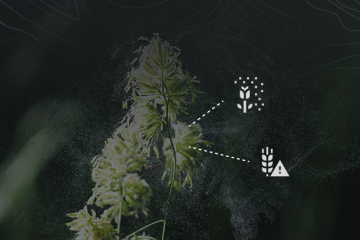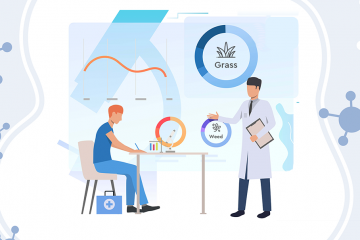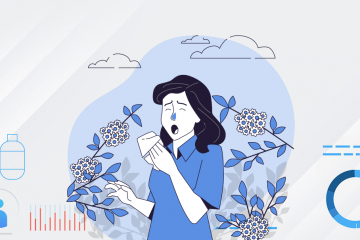Idea in brief
- Millions of people worldwide are sensitive to airborne pollen, which causes health issues such as seasonal allergies, allergic rhinitis, and other respiratory problems.
- Innovation in digital health technologies can make lives easier for both patients and healthcare professionals through well-informed diagnostics and treatments.
- Digital health organizations can leverage Ambee’s pollen data to create personalized and comprehensive solutions to enhance the patient experience.
Pollen is a fine powder usually transported from plant to plant by the wind, birds, or other animals. The function of pollen is to fertilize plants, but at the same time, it can cause misery to people who are vulnerable to seasonal allergies. Living with a pollen allergy isn’t an easy task. With it comes the constant fear of leaving home only to encounter a high density of pollen present in the air, or, worse, the fear of it traveling indoors.
Pollen affects the mucous membranes of the nose and the eyes and often causes nasal congestion and discharge, and irritation to the eyes, nose, inner ears, and roof of the mouth. Millions of people worldwide are hypersensitive to airborne pollen from trees, grasses, and weeds. It is a major allergen that causes symptoms of seasonal allergic rhinitis, commonly known as hay fever, and affects people with existing respiratory ailments.
Pollen grains are small and lightweight, which means that weather conditions also affect pollen levels. They can quickly spread through the wind, which keeps pollen in the air and carries it over to vast distances. Pollen becomes damp and heavy with moisture when it’s humid, keeping it still and on the ground. Hot, dry, and windy weather leads to greater pollen distribution and increases allergy risks.
Tracking Pollen Using Technology
Digital health technologies have made lives easier for physicians and patients by making well-informed diagnostics and remedial decisions. The evolution of data science and technology combined with analytics and artificial intelligence (AI) has modernized the health industry to become efficient, comprehensive, and precise, now more than ever.
While medications are available for pollen allergies, it still is essential to stay clear and manage triggers to avoid being affected in the first place. Modern technology has made this possible. Solutions like electronic health records have helped in the collection of patients’ medical history to improve healthcare using precision medicine and diagnostics.
With solutions that provide an early warning system to track and avoid pollen-infested areas, accurate data and the internet have converged with medical science to detect pollen for asthma and allergy sufferers. This has helped in making the treatment of common conditions, like pollen allergy, to become more affordable and convenient.
Digital Solutions for an Enhanced Patient Experience
While hardware devices like air purifiers or pollen monitoring sensors can help reduce the severity of symptoms associated with pollen allergies, they are often not enough. A comprehensive outlook on overall health deterioration is required to check and monitor the effects of pollen on each individual. With digital solutions such as pollen monitoring and health apps or websites, this is possible with a high degree of precision.
With climate change, annual pollen seasons are getting longer, more prominent, and more complex to predict. Digital health technology can help check the presence of pollen in neighborhoods and make it easier for individuals to steer clear of spaces with high pollen density. Information on the specific type of pollen in the air, whether segregated by type or by subspecies, can go a long way to formulate better plans for pollen season before its commencement.
There are endless possibilities of what technology can do for medicine. In terms of pollen, here are a few ways digital health organizations can use data and technology from environmental organizations like Ambee to make the lives of pollen-allergic individuals better:
Constant Pollen Monitoring: With Ambee’s accurate pollen data and APIs, global and hyperlocal data can be generated to monitor the presence of pollen in the air. This data can be utilized to create apps that can alert an individual or a group to stay clear of a particular location. These apps can provide timely warnings on pollen data and even send regular reminders and alerts based on pollen activity.
Health organizations can create mobile apps that record symptoms and track the patient’s history of allergic reactions for better medical diagnostics and a personalized patient experience. They can also create graphs or heat maps representing the trends of selected symptoms and pollen counts to help people understand the severity of the situation with visual representation.
For example, Ambee assisted Kimberly-Clark Corporation in producing Pollen Pal, a digital health solution, for their customers to make informed decisions. This helped KCC not only alert their customers on pollen count and share insights on associated risks but also enhance customer engagement. The product allowed users in Europe to actively understand the impact of pollen and provided a way to those looking to reduce pollen exposure and live healthier lives.
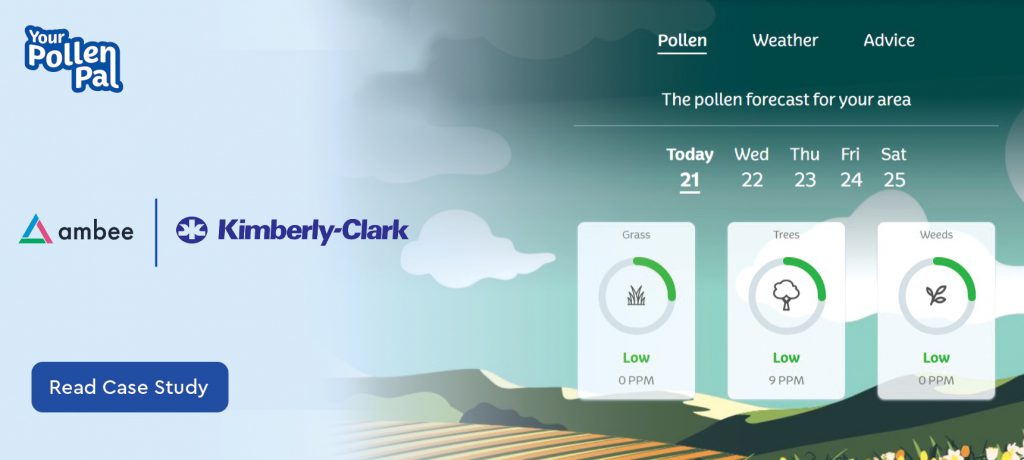
Remote Patient Experience: Individuals with mild pollen allergy do not often require extensive medical care. With simple monitoring of pollen count and constant medical advice, the symptoms can be managed easily.
With comprehensive data on pollen types, species, and count, it becomes easier to reduce the risks. This helps health organizations improve patient communication remotely and help prevent symptoms more conveniently, especially in the post-pandemic world.
With Ambee’s hyperlocal and global pollen API, Juli, a digital health management application, enables its users to manage their chronic conditions related to pollen. Their application stays on the lookout for triggers and potential episodes to prevent health complications and allow users to remain updated on their surroundings.
Precision Healthcare: Pollen exposure impacts people in different ways, and therefore, a one-size-fits-all solution is inadequate when it comes to helping allergy sufferers.
Precision healthcare involves the regular monitoring of symptoms, but with a deeper consideration of the patient’s environment, genes, and lifestyle to formulate unique treatment plans and prevention strategies. Digital health apps give medical teams the necessary mechanisms to better understand patients and their conditions. Ambee’s extensive data and insights on pollen can help health organizations do just that.
An example of this is Wellthy, a digital therapeutics company that combined various factors of the healthcare ecosystem, using data and insights from Ambee’s environmental data to understand the patient better. Ambee’s data helps Wellthy identify allergens, predict personal triggers, and assist in gaining control over issues like seasonal allergies and asthma.
Doctors can recommend monitoring periods, pharmacotherapy, and allergen-specific medicines with precision healthcare. A series of records summarizing the patient’s symptoms and drugs or sublingual immunotherapy (SLIT) intake can also be monitored.
Looking Into the Future
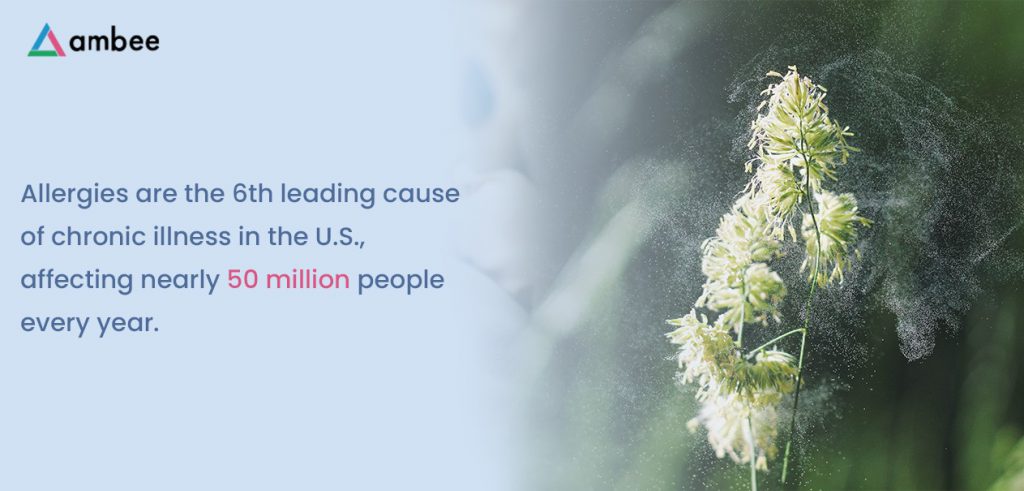
Allergies are the 6th leading cause of chronic illness in the U.S., affecting nearly 50 million people every year. According to the American College of Allergy, Asthma, and Immunology (ACAAI), allergic rhinitis specifically affects between 10%-30% of the entire world population.
Just as Ambee utilizes its own data to create actionable insights in the pollen-monitoring app, digital health organizations can leverage Ambee’s pollen API to achieve similar results. This helps affected individuals stay ahead of the pollen curve, by tracking pollen count in the atmosphere and giving them a better understanding of their immediate environment.
In a world where people think twice before stepping out, innovating digital solutions to serve patients remotely has become a key differentiator. Today, technology is easily accessible, and addressing an issue as common as pollen allergy must be digitized for it to reach the masses in an affordable and comfortable way.
To learn more about how Ambee’s environmental APIs can be of help to you and your organization, checkout : Ambee Pollen Data.
You can also check out our Air quality and Pollen app available on Play Store or App Store.

A creative writer from the heart, a content writer by profession. I spend most of my time reading about something if I’m not outside discovering it. I’m a nature lover and an environmental enthusiast. I believe that every human has a social responsibility to protect the environment they live in, and we must all play our part, however small it may be.
